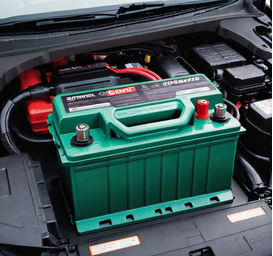
What affects the life of a car battery?
There are many factors which affect how long a car battery will last. Climate and weather conditions play a significant role, as extreme temperatures, whether hot or cold, can dramatically affect battery life expectancy and performance. In scorching environments, corrosion and electrolyte evaporation become prevalent issues, while cold weather can diminish the battery’s capacity and starting power.
Storage location of vehicle can affect battery life as well, a car which is stored in a cool garage will typically last longer than one which is exposed to direct sunlight. Asphalt temperatures can reach as hot as 140F in the summer, causing rapid decline in battery life.
Driving habits and usage patterns also impact battery longevity. Short trips and frequent stops don’t allow the battery sufficient time to recharge fully, while heavy electrical accessory usage can expedite its depletion.
Vehicle Maintenance
Vehicle maintenance practices are equally crucial for extending battery life. Neglecting routine inspections for corrosion, ensuring proper electrolyte levels, and adhering to manufacturer recommendations for charging and storage can all contribute to prolonging the battery’s lifespan. By understanding and addressing these factors, car owners can maximize the longevity and performance of their batteries, minimizing the risk of unexpected failures.
Moreover, the type and quality of the battery are critical determinants. Lead-acid, AGM, and lithium-ion batteries each have their own lifespan, and investing in a reputable brand can make a substantial difference in durability.
it’s vital to consider all aspects of battery maintenance to ensure optimal performance and longevity. Alongside climate conditions, driving habits, battery type, and maintenance practices, regularly inspecting the battery for signs of leaks or cracks is crucial.
Leaks or cracks in the battery casing can lead to electrolyte leakage, which not only diminishes the battery’s effectiveness but also poses safety risks. Electrolyte leakage can corrode surrounding components and cause irreparable damage to the vehicle.
Regular visual inspections should include checking for any signs of corrosion, leaks, or cracks on the battery casing. If any abnormalities are detected, immediate action should be taken to address the issue, whether through repair or replacement of the battery.
By incorporating this additional aspect of inspection into routine maintenance, car owners can effectively identify and mitigate potential issues, prolonging the lifespan and reliability of their batteries.
Looking for a Car Battery Jumper Starter?
Consider Using Our AMAZON© AFFILATE LINKS, as an Amazon Associate I earn from qualifying purchases.
Amazon and the Amazon logo are trademarks of Amazon.com, Inc. or its affiliates
We hope you found this information helpful
Consider reading additional articles on our site
- How long does a car battery typically last?
- What affects the life of a car battery?
- Can I use any type of battery for my car?
- How To Tell What Type of Battery is in Your Car
- What causes corrosion on battery terminals?
- How to Replace a Car Battery Terminal
- How do I clean corrosion off my car battery terminals?
- What is the difference between a deep cycle and regular battery?
- How do I know when I need to replace my car battery?
- Portable Car Battery Jump Starters
- Best Portable Car Battery Jump Starter 2024 for Under $50
- Hazard Class 8 Automotive Batteries




